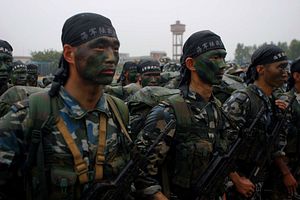An unofficial delegation sent by President Joe Biden visited Taiwan last week in a reaffirmation of the U.S. commitment to Taiwan’s security. The visit came a week after the United States announced new guidelines to “encourage U.S. government engagement with Taiwan that reflects our deepening unofficial relationship.” The visit, along with the formal invitation of Taiwan’s top representative to Biden’s inauguration, followed by supportive policies and statements, has removed doubts that there could be cutbacks to the U.S. commitment to Taiwan in order to stabilize relations with Beijing.
Beijing, which views Taiwan as a breakaway province that should be put under PRC control, responded to the delegation’s visit with live military drills, its go-to response for incidents indicating closer Taiwan-U.S. relations. Live-fire exercises were conducted as a “strong countermeasure” to then-Health Secretary Alex Azar and then-Energy and Economy Undersecretary Keith Krach’s visits to Taiwan last year.
In response to growing Taiwan-U.S. ties, Beijing flew a record of 380 jets across the Taiwan Strait in 2020, and has broken the record for the size of jet incursions into Taiwan’s airspace twice in the three month since Biden took office. The trend reflects China’s growing reliance on military means to reign in Taiwan’s “pro-independence” behaviors. Experts call China’s steps a form of psychological warfare meant to “constantly remind Taiwan’s people of its growing power, induce pessimism about Taiwan’s future, deepen splits within the island’s political system and show that outside powers are impotent to counter its flexes.”
Beijing’s preference for responding to “violations” with demonstrations of military might speaks to the ineffectiveness of non-military measures to achieve its goals. Its pro-military approach can be attributed to the ineffectiveness of past efforts at economic coercion. Beijing’s ban on solo travelers to Taiwan in 2019 failed to hurt Taiwan’s tourism as the island actually saw a record number of international travelers. Sanctions on Taiwan’s pineapples were cushioned by buyers stepping up from other markets. While the mainland remains Taiwan’s largest export market, China’s reliance on Taiwan’s tech exports, particularly integrated circuits, means that using trade as leverage for economic coercion against Taiwan risks damaging Beijing’s own manufacturing economy. The use of economic coercion would also create momentum for economic decoupling across the strait, which would remove any remaining hopes of achieving peaceful unification through the policy of “promoting reunification through the economy.” While China could have terminated the Cross-Straits Economic Cooperation Framework Agreement (ECFA), an option that China’s state-owned China Global Television Network has hinted at, it was ultimately not carried out, showing China’s reluctance to decouple with Taiwan economically.
Likewise, China’s diplomatic coercion – stripping away Taiwan’s remaining diplomatic allies with promises of financial assistance and gifts – has failed to produce desirable results. Taiwan appears to be growingly resilient against China’s diplomatic coercion. A poll by the Taiwan Public Opinion Foundation revealed that 53 percent of Taiwanese were unmoved by China severing Taiwan’s formal ties with the Solomon Islands and Kiribati and that the public is growing accustomed to Taiwan’s diplomatic isolation. Also, Taiwan has seen increased support from the United States, the European Union and its members, and Japan – a trend that is gaining steam with the liberal democracies’ strategic reorientation toward the Indo-Pacific.
Beijing is also devoid of allies within Taiwan to act as countervailing forces to balance the Democratic Progressive Party’s “provocative” policies. Not only do the “pro-mainland” Kuomintang and Ko Wen-je’s Taiwan People’s Party pose no credible opposition against the prevailing ruling party, but these parties also actively seek better ties with the United States.
China believes that unification is inevitable in the long term. In a speech, the powerful Politburo member Wang Yang remarked that “time and trends” are on China’s side. While this mentality exudes confidence, U.S. support for Taiwan has vexed Beijing due to the belief that Taiwan’s leadership is “pro-independence.” Also, Chinese leader Xi Jinping is under pressure to partially achieve within his lifetime the goal of the “great rejuvenation of the Chinese nation,” which the unification of Taiwan is an essential part of. With a depleting pool of non-military countermeasures, Beijing is increasingly resorting to military pressure to discourage independence and deter other nations from colluding with Taiwan’s ruling party.
Beijing’s assertive and intolerant stance on Taiwan combined with the increasing propensity to use military force presents a dilemma for the United States: While the policy of “strategic ambiguity” allows Washington to avoid committing to the defense of Taiwan against a Chinese invasion, China’s growing military coercion behooves the U.S. to act with blunt and consistent support to demonstrate to Taiwan and other partners that Washington would not abandon Taiwan and its democracy. However, U.S. support for Taiwan would, in turn, propel Beijing to raise military threats to maintain its psychological pressure, which would compel the United States to act with more support for Taiwan to uphold the credibility of its commitment.
This dilemma becomes more problematic considering China’s propensity to punish Taiwan rather than states that shore up ties with Taiwan. China has issued inconsistent and symbolic punishment of U.S. officials and foreign businesses over supporting Taiwan but has shown great resolve to coerce Taiwan over any perceived provocations. Since China considers its over 2,000 missiles aimed at Taiwan insufficient for deterring independence, and its huge market has not made unification a more favorable prospect for the Taiwanese, China and the United States are now locked in a security dilemma where China will increase military coercion against Taiwan regardless of the nature of the support the U.S. provides to Taiwan.
































